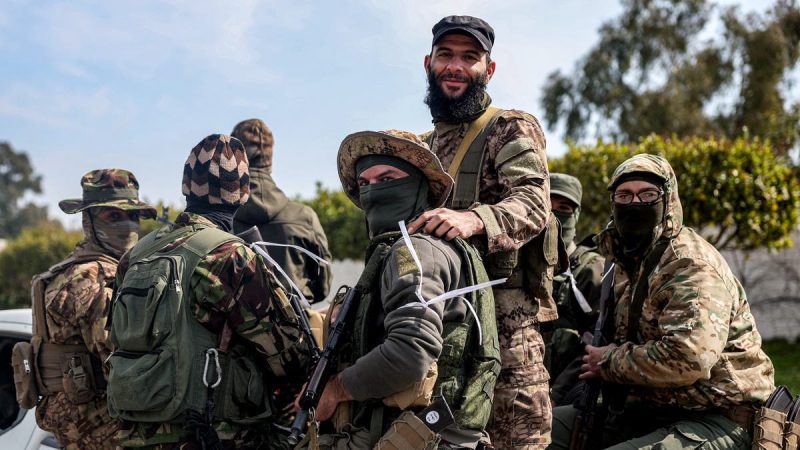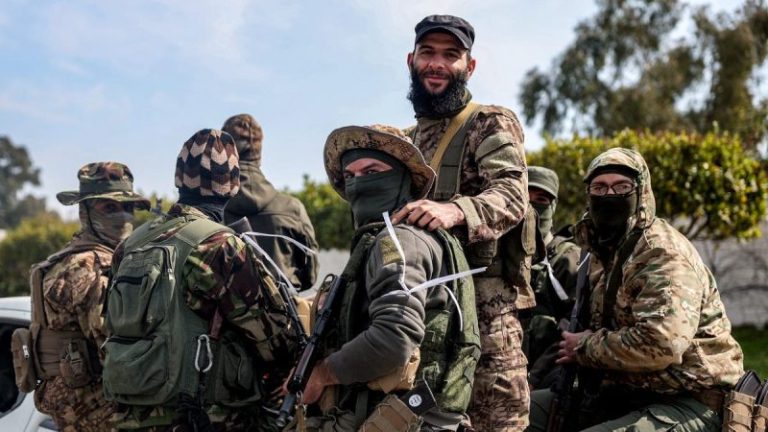
A deadly insider attack that killed two U.S. service members in Syria is prompting fresh scrutiny of the Trump administration’s counter-ISIS approach and its rapid embrace of Syria’s new leader, Ahmed al-Sharaa.
While Republican lawmakers largely urge a stronger campaign to contain ISIS, the shooting has exposed vulnerabilities inside Syria’s fledgling security institutions and raised new questions about whether the U.S. can rely on Syrian forces as the administration seeks to stabilize the country.
The incident has now become a flash point in a broader debate: whether the administration is underestimating ISIS’s resilience, overestimating the reliability of Syria’s fledgling institutions and potentially risking a withdrawal that could give the terror group room to rebound.
Syrian officials say the gunman was part of the new post-Assad security apparatus and had been flagged internally for extremist leanings. He reportedly was in the process of being reassigned when he opened fire on American personnel, killing two service members and injuring an American civilian before being shot dead.
The attack immediately raised questions about the strength of U.S.–Syrian cooperation — a partnership that hinges on Washington’s willingness to trust a government led by a man who was, until recently, a wanted terrorist himself. Trump officials have argued that al-Sharaa is essential to stabilizing Syria after Bashar al-Assad’s downfall, but critics say the weekend shooting reveals glaring cracks in that strategy.
Indiana Republican Sen. Jim Banks defended Trump’s approach, saying on Fox News that the president ‘rooted out and took out the ISIS caliphate in his first term’ and ‘is going to do that again’ in his second. But Sen. Jack Reed, D-R.I., the top Democrat on the Senate Armed Services Committee, pushed back sharply.
‘There’s been some discussion, the president has claimed repeatedly he defeated the caliphate, ISIS etc., and that’s not the case at all,’ Reed said on ‘Fox News Sunday.’ ‘Our intelligence agencies tell us that ISIS is still the most capable and dangerous Islamic terrorist group who have already demonstrated that their intent is to strike even within the United States.’
Reed and others argue that the ambush underscores why a U.S. presence in Syria remains necessary despite political pressure from Trump’s base to reduce deployments abroad. But some Republicans counter that the attack proves the opposite — that the mission has become strategically dubious and unacceptably dangerous.
‘The soldiers who died are obviously heroes … but the purpose of whether or not they should be there or not is a big question,’ Sen. Rand Paul, R-Ky., said on NBC’s ‘Meet the Press.’
Paul, who chairs the Homeland Security Committee, said the attack should force a reconsideration of why U.S. troops remain in the country at all.
‘A couple hundred troops in Syria are more of a trip wire than a strategic asset. I don’t think they deter war.’
Rep. Marjorie Taylor Greene, R-Ga., added that U.S. troops ‘should not be sent to foreign countries to be killed in foreign lands like Syria… Bring our troops home!!!’
The administration, however, has indicated it intends to double down. Tom Barrack, Trump’s envoy to Syria, said the killings ‘underscore the need for continued cooperation’ with al-Sharaa’s government.
Trump himself said al-Sharaa was ‘devastated’ by the attack and vowed ‘very serious retaliation.’
But national security specialists caution that the administration may be moving too quickly to normalize ties with Syria’s new leadership. Michael Makovsky, CEO of the Jewish Institute of National Security of America (JINSA), said Washington appears reluctant to confront the fact that the shooter came from within al-Sharaa’s own security forces.
‘The administration is very invested right now in Shaara, and seems to want to minimize that the killer was from Shaara’s security forces,’ Makovsky said.
He warned that ‘a lot of bad people’ remain embedded in the new Syrian institutions and that early cooperation should not come with premature sanctions relief. ‘His security forces have committed a lot of atrocities against minorities … I’m worried the administration is not focused on that.’
What retaliation might look like
Trump has vowed retribution for what he called ‘an ISIS attack against the U.S., and Syria, in a very dangerous part of Syria.’ But the White House has not clarified what specific steps it is considering.
The White House did not provide additional clarification on what types of retaliation the U.S. would pursue in response to the attack, and referred Fox News Digital back to Trump’s initial statement.
However, Trump later told reporters Monday that ‘they’ll be hit hard’ when asked about the U.S. response. He also voiced support for al-Sharaa, and said he still has confidence in Syria’s new leader.
Mona Yacoubian, director of the Middle East Program at the Center for Strategic and International Studies, said the administration’s response will depend on what investigators determine about the attacker’s affiliations.
Syria’s Interior Ministry spokesman, Noureddine al-Baba, said the gunman had been scheduled to be relieved of duty Sunday after authorities identified he held ‘extremist’ views. Al-Baba told The Associated Press that the government had been forced to recruit quickly amid severe security shortages following Assad’s ouster.
The fact that the shooter, who was ultimately shot during the attack, was part of the Syrian security forces adds another layer of complexity, Yacoubian said.
If the gunman was part of a specific cell affiliated with a group like ISIS, that could prompt the Trump administration to launch strikes targeting leadership of the respective group or the group’s infrastructure, according to Yacoubian.
Regardless, Yacoubian said that the attack raises alarms in terms of the vetting process for security forces and will prompt the Trump administration to dramatically increase their vetting and understanding of the security forces as it continues to partner with Syrian national forces.
U.S. forces in Syria currently work in tandem with both Syrian national forces and the Kurdish Syrian Democratic Forces (SDF) on efforts to counter ISIS in Syria.
The strategic crossroads
Dan Shapiro, former deputy assistant secretary of Defense for the Middle East, said Trump must resist the growing pressure — including from some in his base — to pull U.S. troops out of Syria.
Earlier in 2025, the administration reduced its footprint in Syria. The U.S. currently has roughly 900 U.S. troops stationed in Syria — a drop from the roughly 2,000 that were deployed in Syria following Hamas’ Oct. 7, 2023, attack against Israel.
‘There will undoubtedly be some calls from his base to bring troops home from Syria. He will need to resist those calls,’ Shapiro said in an email to Fox News Digital Monday. ‘Leaving Syria when Syrian national forces are still finding their footing against ISIS and need support would almost certainly give ISIS more room to breathe. A precipitous U.S. withdrawal would also be seen as a victory for ISIS.’
Shapiro said that as the U.S. intensifies cooperation with Syrian national forces and the SDF, Syria will become increasingly dependent on U.S. intelligence to identify infiltrators or sympathizers within its ranks.
Still, Shapiro warned that U.S. forces must remain cautious because the Syrian government’s ability to follow through remains uncertain, and so the Syrian forces must prove themselves as trustworthy — or else sanctions that the Trump administration lifted in May could return, he said.
‘Trump is both going to need and expect more from Ahmed al-Sharaa, and shorten the leash at the same time,’ Shapiro said. ‘Syria should understand that continued sanctions relief could be jeopardized unless they demonstrate clear commitment and capability to root out ISIS infiltrators.’
The Associated Press contributed to this report.
























